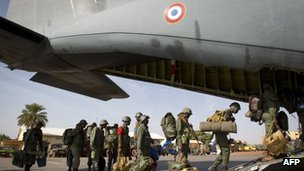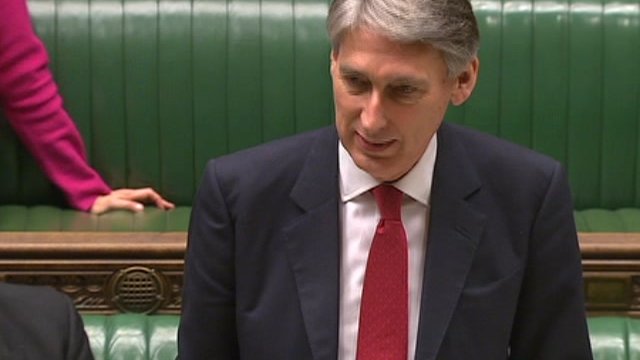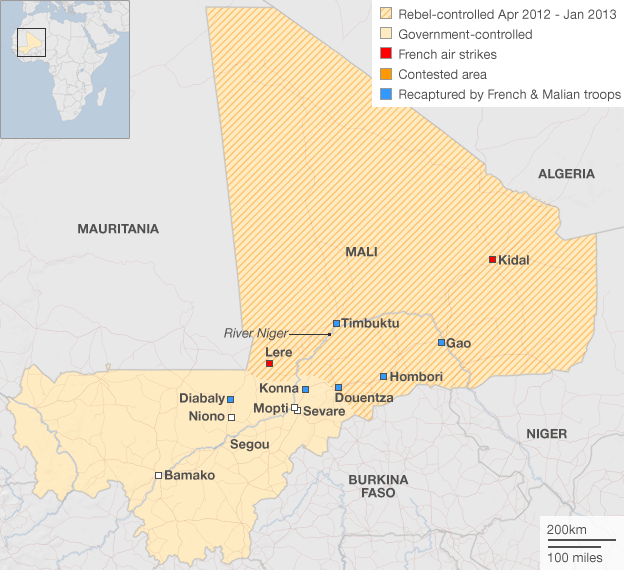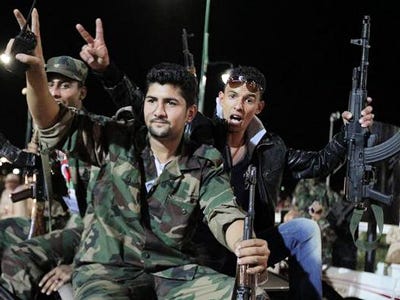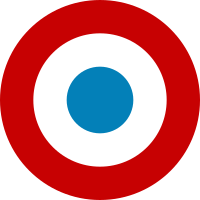- Joined
- Oct 24, 2006
- Messages
- 2,766
TIMELINE- http://www.bbc.co.uk/news/world-africa-13881978
A chronology of key events:
11th century - Empire of Mali becomes dominant force in the upper Niger basin, its period of greatness beginning under King Sundiata in 1235 and peaking under Mansa Musa who ruled between 1312 and 1337 and extended empire to the Atlantic.
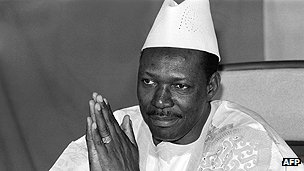 Moussa Traore took power in a 1968 coup and ruled until 1991
Moussa Traore took power in a 1968 coup and ruled until 1991
14th-15th centuries - Decline of the Empire of Mali, which loses dominance of the gold trade to the Songhai Empire, which makes its base in Timbuktu - historically important as a focal point of Islamic culture and a trading post on the trans-Saharan caravan route.
Late 16th century - Moroccans defeat the Songhai, make Timbuktu their capital and rule until their decline in the 18th century.
19th century - French colonial advance, and Islamic religious wars which lead to creation of theocratic states.
1898 - France completes conquest of Mali, then called French Sudan.
1959 - Mali and Senegal form the Mali Federation, which splits a year later.
Independence
1960 - Mali becomes independent with Modibo Keita as president. It becomes a one-party, socialist state and withdraws from the Franc zone.
1968 - Keita ousted in coup led by Lieutenant Moussa Traore.
1977 - Protests erupt following Keita's death in prison.
1979 - New constitution provides for elections; Traore re-elected president.
1985 - Mali and Burkina Faso engage in border fighting.
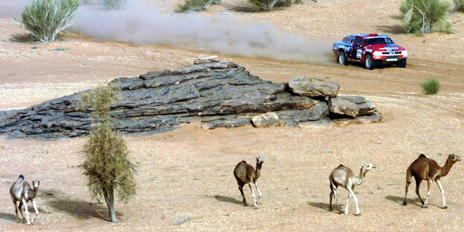 Mali used to be on the route of the gruelling Paris to Dakar rally
Mali used to be on the route of the gruelling Paris to Dakar rally
1991 - Traore deposed in coup and replaced by transitional committee.
Democracy
1992 - Alpha Konare wins multiparty elections to become Mali's first democratically-elected president.
1995 - Peace agreement with Tuareg tribes leads to return of thousands of refugees.
1999 - Former President Moussa Traore sentenced to death on corruption charges, but has his sentence commuted to life imprisonment by President Konare.
1999 October - Several people killed in fighting in the north between members of the Kunta tribe and an Arab community over local disputes.
2000 February - Konare appoints former International Monetary Fund official Mande Sidibe prime minister.
2001 December - Manantali dam in southwest produces its first megawatt of hydro-electricity, 13 years after it was completed.
Amadou Toure
2002 April - Amadou Toumani Toure elected president by landslide. Poll is marred by allegations of fraud.
2002 September - France says it will cancel 40% of debts owed to it by Mali, amounting to some 80m euros ($79m, £51m).
2002 October - Government resigns, without public explanation. New "government of national unity" is unveiled.
2003 August - Clashes between rival Muslim groups in west kill at least 10 people.
2004 April - Prime Minister Mohamed Ag Amani resigns and is replaced by Ousmane Issoufi Maiga.
2004 September - Agriculture minister says severe locust plague has cut cereal harvest by up to 45%.
2005 June - World Food Programme warns of severe food shortages, the result of drought and locust infestations in 2004.
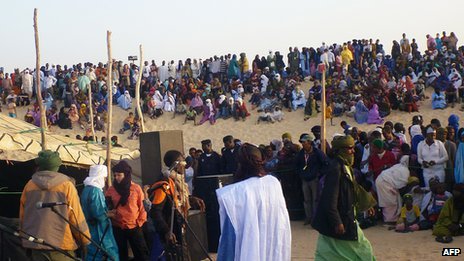 Mali's popular annual Desert Festival - described as a Saharan Woodstock - was moved closer to Timbuktu because of security concerns
Mali's popular annual Desert Festival - described as a Saharan Woodstock - was moved closer to Timbuktu because of security concerns
2006 June - The government signs an Algerian-brokered peace deal with Tuareg rebels seeking greater autonomy for their northern desert region. The rebels looted weapons in the town of Kidal in May, raising fears of a new rebellion.
2007 April - President Toure wins a second five-year term in elections.
2007 July - The ruling coalition, Alliance for Democracy and Progress (ADP), strengthens its hold on parliament in elections.
Rebel activity
2007 August - Suspected Tuareg rebels abduct government soldiers in separate incidents near the Niger and Algerian borders.
2008 May - Tuareg rebels kill 17 soldiers in attack on an army post in the northeast, despite a ceasefire agreed a month earlier.
2008 December - At least 20 people are killed and several taken hostage in an attack by Tuareg rebels on a military base in northern Mali.
2009 February - Government says the army has taken control of all the bases of the most active Tuareg rebel group. A week later, 700 rebels surrender their weapons in ceremony marking their return to the peace process.
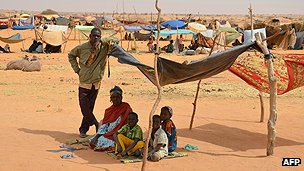 Conflict in the north of the country prompted thousands to flee
Conflict in the north of the country prompted thousands to flee
2009 May - Algeria begins sending military equipment to Mali in preparation for a joint operation against Islamic militants linked to al-Qaeda.
2009 August - New law boosts women's rights, prompts some protests.
2010 January - Annual music event - Festival in the Desert - is moved from a desert oasis to Timbuktu because of security fears.
Terror challenge
2010 April - Mali, Algeria, Mauritania and Niger set up joint command to tackle threat of terrorism.
2012 January - Fears of new Tuareg rebellion following attacks on northern towns which prompt civilians to flee into Mauritania.
Continue reading the main story
Political crisis - 2012
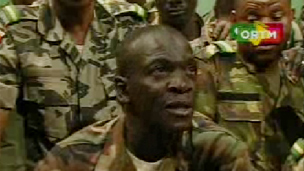
President is ousted in coup, Tuareg rebels and Islamists seize north of country
2012 March - Military officers depose President Toure ahead of the April presidential elections, accusing him of failing to deal effectively with the Tuareg rebellion. African Union suspends Mali.
2012 April - Tuareg rebels seize control of northern Mali, declare independence.
Military hands over to a civilian interim government, led by President Dioncounda Traore.
2012 May - Junta reasserts control after an alleged coup attempt by supporters of ousted President Toure in Bamako.
Pro-junta protesters storm presidential compound and beat Mr Traore unconscious.
The Tuareg MNLA and Islamist Ansar Dine rebel groups merge and declare northern Mali to be an Islamic state. Ansar Dine begins to impose Islamic law in Timbuktu. Al-Qaeda in North Africa endorses the deal.
2012 June-July - Ansar Dine and its Al-Qaeda ally turn on the MNLA and capture the main northern cities of Timbuktu, Kidal and Gao. They begin to destroy many Muslim shrines that offend their puritan views.
2012 August - Prime Minister Cheick Modibo Diarra forms a new government of national unity in order to satisfy regional demands for a transition from military-dominated rule. The cabinet of 31 ministers includes five seen as close to coup leader Capt Amadou Sanogo.
2012 Autumn-Winter - Northern Islamist rebels consolidate their hold on the north. They seize strategically important town of Douentza in September, crossing into the central part of Mali and closer to the government-held south-west.
Continue reading the main story
Enigmatic leader
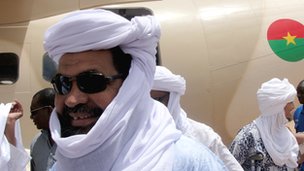
The radical Islamist group Ansar Dine was founded by Tuareg rebel Iyad Ag Ghaly
2012 November - The West African regional grouping Ecowas agrees a coordinated military expedition to recapture the north, with UN and African Union backing. Preparations are expected to take several months.
2012 December - Prime Minister Cheick Modibo Diarra resigns, allegedly under pressure from army leaders who oppose plans for Ecowas military intervention. President Traore appoints a presidential official, Django Sissoko, to succeed him. The UN and US threaten sanctions.
French intervention
2013 January - Islamist fighters capture the central town of Konna and plan to march on the capital. President Traore asks France for help. French troops rapidly capture Gao and Timbuktu and advance on Kidal, the last major city in the north. European countries pledge to help retrain the Malian army.
January 10:
Some 1,200 Islamists capture the government-held central town of Konna and say they will push farther south, after several days of clashes with the army.
- Mali's interim president Dioncounda Traore asks France for help.
- Witnesses say that foreign troops and weapons have begun arriving by transport plane at an army base in Sevare, just 43 miles from Konna.
- January 11:
Related Articles
- French President Francois Hollande confirms French troops are actively supporting the offensive by Malian forces.
- The 15-nation west African bloc ECOWAS gives its go-ahead for the immediate deployment of troops.
- January 12:
Mali's army retakes control of Konna after one of the worst clashes with Islamists since the start of the crisis. French Defence Minister Jean-Yves Le Drian announces the death of a French helicopter pilot in the battle. The clashes kill around 100 Islamists, according to the Malian military.
- January 13:
France keeps up airstrikes on Mali, targeting Islamist bases in the northern regions of Gao and Kidal.
- Four French Rafale fighter jets bomb targets near the town of Gao, which has been controlled by Al-Qaeda offshoot the Movement for Oneness and Jihad in West Africa (MUJAO), destroying rebel training camps and logistical bases, according to the French defence ministry. More than 60 jihadists are killed in Gao and its outskirts, according to residents.
- French President Francois Hollande says the intervention has stopped a southward rebel advance seen as threatening the capital Bamako, but stresses France's mission is not over.
- Benin and Togo follow Niger, Burkina Faso and Senegal in promising troops. Britain says it will send aircraft for logistical support.
- Algeria has authorised French warplanes to use its airspace for bombing raids on Mali, French Foreign Minister Laurent Fabius says.
- January 14:
Islamists seize the town of Diabaly in government-held territory, 250 miles north of the capital. They vow to "strike at the heart of France".
- French warplanes pound Islamist positions in the town of Douentza in central Mali.
- Rebels abandon key northern bases under pressure from French airstrikes. Residents in the towns of Gao, Douentza and Timbuktu report all Islamists have fled, though an Ansar Dine spokesman calls it a "tactical retreat".
- Ethnic-Tuareg separatists say they are ready to support the French military intervention by taking on Islamist rebels on the ground.
- NATO says it supports French efforts but that the alliance has received no request for assistance.
- Nigerian troops will arrive in Mali "before next week", announces President Goodluck Jonathan.
Source: AFP
http://www.telegraph.co.uk/news/wor...nocean/mali/9801760/Mali-crisis-timeline.html
In Mali

Mali crisis: timeline

On the frontline in Mali

Mali crisis in pictures

France sends more troops to Mali as UN backs intervention

Mali: al-Qaeda have numerous options for retaliation
A chronology of key events:
11th century - Empire of Mali becomes dominant force in the upper Niger basin, its period of greatness beginning under King Sundiata in 1235 and peaking under Mansa Musa who ruled between 1312 and 1337 and extended empire to the Atlantic.

14th-15th centuries - Decline of the Empire of Mali, which loses dominance of the gold trade to the Songhai Empire, which makes its base in Timbuktu - historically important as a focal point of Islamic culture and a trading post on the trans-Saharan caravan route.
Late 16th century - Moroccans defeat the Songhai, make Timbuktu their capital and rule until their decline in the 18th century.
19th century - French colonial advance, and Islamic religious wars which lead to creation of theocratic states.
1898 - France completes conquest of Mali, then called French Sudan.
1959 - Mali and Senegal form the Mali Federation, which splits a year later.
Independence
1960 - Mali becomes independent with Modibo Keita as president. It becomes a one-party, socialist state and withdraws from the Franc zone.
1968 - Keita ousted in coup led by Lieutenant Moussa Traore.
1977 - Protests erupt following Keita's death in prison.
1979 - New constitution provides for elections; Traore re-elected president.
1985 - Mali and Burkina Faso engage in border fighting.

1991 - Traore deposed in coup and replaced by transitional committee.
Democracy
1992 - Alpha Konare wins multiparty elections to become Mali's first democratically-elected president.
1995 - Peace agreement with Tuareg tribes leads to return of thousands of refugees.
1999 - Former President Moussa Traore sentenced to death on corruption charges, but has his sentence commuted to life imprisonment by President Konare.
1999 October - Several people killed in fighting in the north between members of the Kunta tribe and an Arab community over local disputes.
2000 February - Konare appoints former International Monetary Fund official Mande Sidibe prime minister.
2001 December - Manantali dam in southwest produces its first megawatt of hydro-electricity, 13 years after it was completed.
Amadou Toure
2002 April - Amadou Toumani Toure elected president by landslide. Poll is marred by allegations of fraud.
2002 September - France says it will cancel 40% of debts owed to it by Mali, amounting to some 80m euros ($79m, £51m).
2002 October - Government resigns, without public explanation. New "government of national unity" is unveiled.
2003 August - Clashes between rival Muslim groups in west kill at least 10 people.
2004 April - Prime Minister Mohamed Ag Amani resigns and is replaced by Ousmane Issoufi Maiga.
2004 September - Agriculture minister says severe locust plague has cut cereal harvest by up to 45%.
2005 June - World Food Programme warns of severe food shortages, the result of drought and locust infestations in 2004.

2006 June - The government signs an Algerian-brokered peace deal with Tuareg rebels seeking greater autonomy for their northern desert region. The rebels looted weapons in the town of Kidal in May, raising fears of a new rebellion.
2007 April - President Toure wins a second five-year term in elections.
2007 July - The ruling coalition, Alliance for Democracy and Progress (ADP), strengthens its hold on parliament in elections.
Rebel activity
2007 August - Suspected Tuareg rebels abduct government soldiers in separate incidents near the Niger and Algerian borders.
2008 May - Tuareg rebels kill 17 soldiers in attack on an army post in the northeast, despite a ceasefire agreed a month earlier.
2008 December - At least 20 people are killed and several taken hostage in an attack by Tuareg rebels on a military base in northern Mali.
2009 February - Government says the army has taken control of all the bases of the most active Tuareg rebel group. A week later, 700 rebels surrender their weapons in ceremony marking their return to the peace process.

2009 May - Algeria begins sending military equipment to Mali in preparation for a joint operation against Islamic militants linked to al-Qaeda.
2009 August - New law boosts women's rights, prompts some protests.
2010 January - Annual music event - Festival in the Desert - is moved from a desert oasis to Timbuktu because of security fears.
Terror challenge
2010 April - Mali, Algeria, Mauritania and Niger set up joint command to tackle threat of terrorism.
2012 January - Fears of new Tuareg rebellion following attacks on northern towns which prompt civilians to flee into Mauritania.
Continue reading the main story
Political crisis - 2012

President is ousted in coup, Tuareg rebels and Islamists seize north of country
2012 March - Military officers depose President Toure ahead of the April presidential elections, accusing him of failing to deal effectively with the Tuareg rebellion. African Union suspends Mali.
2012 April - Tuareg rebels seize control of northern Mali, declare independence.
Military hands over to a civilian interim government, led by President Dioncounda Traore.
2012 May - Junta reasserts control after an alleged coup attempt by supporters of ousted President Toure in Bamako.
Pro-junta protesters storm presidential compound and beat Mr Traore unconscious.
The Tuareg MNLA and Islamist Ansar Dine rebel groups merge and declare northern Mali to be an Islamic state. Ansar Dine begins to impose Islamic law in Timbuktu. Al-Qaeda in North Africa endorses the deal.
2012 June-July - Ansar Dine and its Al-Qaeda ally turn on the MNLA and capture the main northern cities of Timbuktu, Kidal and Gao. They begin to destroy many Muslim shrines that offend their puritan views.
2012 August - Prime Minister Cheick Modibo Diarra forms a new government of national unity in order to satisfy regional demands for a transition from military-dominated rule. The cabinet of 31 ministers includes five seen as close to coup leader Capt Amadou Sanogo.
2012 Autumn-Winter - Northern Islamist rebels consolidate their hold on the north. They seize strategically important town of Douentza in September, crossing into the central part of Mali and closer to the government-held south-west.
Continue reading the main story
Enigmatic leader

The radical Islamist group Ansar Dine was founded by Tuareg rebel Iyad Ag Ghaly
2012 November - The West African regional grouping Ecowas agrees a coordinated military expedition to recapture the north, with UN and African Union backing. Preparations are expected to take several months.
2012 December - Prime Minister Cheick Modibo Diarra resigns, allegedly under pressure from army leaders who oppose plans for Ecowas military intervention. President Traore appoints a presidential official, Django Sissoko, to succeed him. The UN and US threaten sanctions.
French intervention
2013 January - Islamist fighters capture the central town of Konna and plan to march on the capital. President Traore asks France for help. French troops rapidly capture Gao and Timbuktu and advance on Kidal, the last major city in the north. European countries pledge to help retrain the Malian army.
January 10:
Some 1,200 Islamists capture the government-held central town of Konna and say they will push farther south, after several days of clashes with the army.
- Mali's interim president Dioncounda Traore asks France for help.
- Witnesses say that foreign troops and weapons have begun arriving by transport plane at an army base in Sevare, just 43 miles from Konna.
- January 11:
Related Articles
- Mali crisis in pictures
15 Jan 2013 - Mali: African troops due to arrive in days
15 Jan 2013 - British military 'could be sent to Mali to support EU training'
14 Jan 2013 - Mali: al-Qaeda have numerous options for retaliation
14 Jan 2013 - Islamist fighters in Mali seize control of southern town in daring counter offensive
14 Jan 2013
- French President Francois Hollande confirms French troops are actively supporting the offensive by Malian forces.
- The 15-nation west African bloc ECOWAS gives its go-ahead for the immediate deployment of troops.
- January 12:
Mali's army retakes control of Konna after one of the worst clashes with Islamists since the start of the crisis. French Defence Minister Jean-Yves Le Drian announces the death of a French helicopter pilot in the battle. The clashes kill around 100 Islamists, according to the Malian military.
- January 13:
France keeps up airstrikes on Mali, targeting Islamist bases in the northern regions of Gao and Kidal.
- Four French Rafale fighter jets bomb targets near the town of Gao, which has been controlled by Al-Qaeda offshoot the Movement for Oneness and Jihad in West Africa (MUJAO), destroying rebel training camps and logistical bases, according to the French defence ministry. More than 60 jihadists are killed in Gao and its outskirts, according to residents.
- French President Francois Hollande says the intervention has stopped a southward rebel advance seen as threatening the capital Bamako, but stresses France's mission is not over.
- Benin and Togo follow Niger, Burkina Faso and Senegal in promising troops. Britain says it will send aircraft for logistical support.
- Algeria has authorised French warplanes to use its airspace for bombing raids on Mali, French Foreign Minister Laurent Fabius says.
- January 14:
Islamists seize the town of Diabaly in government-held territory, 250 miles north of the capital. They vow to "strike at the heart of France".
- French warplanes pound Islamist positions in the town of Douentza in central Mali.
- Rebels abandon key northern bases under pressure from French airstrikes. Residents in the towns of Gao, Douentza and Timbuktu report all Islamists have fled, though an Ansar Dine spokesman calls it a "tactical retreat".
- Ethnic-Tuareg separatists say they are ready to support the French military intervention by taking on Islamist rebels on the ground.
- NATO says it supports French efforts but that the alliance has received no request for assistance.
- Nigerian troops will arrive in Mali "before next week", announces President Goodluck Jonathan.
Source: AFP
http://www.telegraph.co.uk/news/wor...nocean/mali/9801760/Mali-crisis-timeline.html
In Mali

Mali crisis: timeline

On the frontline in Mali

Mali crisis in pictures

France sends more troops to Mali as UN backs intervention

Mali: al-Qaeda have numerous options for retaliation



